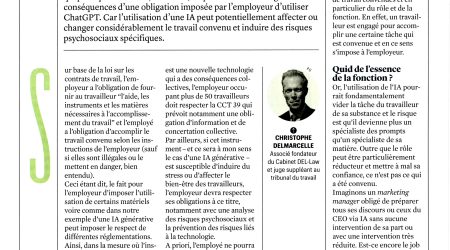How to protect my staff?
Posted the 12 March 2020Hygiene measures, telecommuting, travel restrictions, and even meetings. To keep their staff away from the epidemic, companies are implementing policies that vary in strictness. This is necessary for business continuity, but also a legal obligation.
Whether they employ 10 people or 5,000, companies have a duty to ensure the well-being, health, and safety of their employees. As the coronavirus gradually spreads in Belgium, employers must take preventive measures. "Based on the law of August 4, 1996, and the Occupational Health and Safety Code, the employer has very heavy obligations regarding risk prevention and analysis," warns Christophe Delmarcelle, partner in labor law at DKW. Failing to comply exposes the company to criminal sanctions and civil liability.
Hygiene in the workplace
Most large companies have already implemented measures. These range from displaying instructions (such as washing hands, etc.) and providing hand sanitizers to implementing specific hygiene measures. For example, at Engie, "the frequency of cleaning common areas, coffee corners, door handles, and elevator buttons has been increased," says Anne-Sophie Hugé, spokesperson for Engie in Belgium. "Additionally, in our buildings, we have ensured that ventilation is appropriate, using fresh air instead of ambient air." These are specific actions that most companies can easily implement.
At BNP Paribas Fortis (where a case of coronavirus was detected earlier this week), a policy has been communicated since the beginning of the epidemic. Among the measures is the limitation of gatherings. "Meetings should be held remotely as much as possible, transfers between buildings should be avoided, and physical meetings with more than 10 people, including more than two people coming from abroad, must be canceled or held remotely," reads a memo from the bank. This is part of the legally mandatory precautionary measures, along with the provision of protective equipment such as masks, suits, soap, etc.
Limited travel
In all companies, international travel is starting to be strictly limited. "All business trips to and from China and other high-risk areas are suspended," says the spokesperson for Engie. This also applies to Italy and France...
At Tapptic, a smaller group than Engie, "we have also put all travel on 'pause,' details its CEO Alexandre de Saedeleer, whether it's trips between the different entities of the group or to clients. It's not about panic, people continue to come to work, but we adopt a 'responsible' attitude. We can't turn a blind eye: traveling and being in airports today is not a good idea. We don’t want Tapptic to take risks for the employees. We must adopt a protective attitude."
Quarantines and remote work
The agency, specializing in mobile apps, has increased the number of remote work days per week for its staff from two to three. This is a practice that most companies have decided to facilitate, or even encourage. This is easy for jobs that allow it, provided the company has deployed the appropriate remote work and collaborative work tools.
It obviously starts with the "exposed" individuals. At BNP Paribas Fortis, for example, employees returning from one of the high-risk areas must wait at least 14 calendar days before returning to the office. "In consultation with their manager, employees can work remotely during the entire period," say the bank's officials. Even if their role is not recorded as suitable for remote work, the manager can authorize "occasional remote work" by assigning specific tasks that can be done from home. Employees also have the option to take one or more days off or recuperation leave. If none of these options are possible, the manager must report it to the HR department. An appropriate solution will be sought, with salary maintenance. Employees who are confined to their homes but do not have their professional laptop can contact their manager, who will take the necessary steps to have the laptop delivered to their home.
In principle, "the employer can refuse access to the workplace to employees based on suspicion or symptoms," says lawyer Christophe Delmarcelle, "but such a refusal could lead to a breach of contract, even with salary maintenance. It would therefore be better to agree with the workers on remote work (for example, occasional telework) or a paid quarantine..."
But what about the salary payment of an employee in quarantine (who is not teleworking)? "If the employee is sick, the employer only has to pay the guaranteed salary (for one month)," responds the labor law lawyer. "If the employee is not sick and there are no mandatory quarantine measures from the state, the employer must continue to pay the salary. Finally, if there is a mandatory quarantine, unemployment benefits apply."
What the employer cannot do.
Given the situation, many companies are implementing measures to protect their teams and clients. However, not everything is allowed. According to Christophe Delmarcelle, "based on the law of January 23, 2003, the employer cannot impose a medical examination (biological or genetic), except for security or surveillance positions. In any case, only the prevention advisor or the occupational doctor is authorized to carry out such examinations. Similarly, the employer cannot require a temperature check before entering the company. However, they could ask the employee to take their own temperature as a condition of access to the premises or request the prevention advisor to impose it if deemed necessary. It will be useful to remind the employee that they have an obligation not to do anything that could endanger their colleagues, the employer, or others."
Related articles

Is an employer allowed to mandate the use of artificial intelligence tools by employees ? (Trends, 17-07-2025)

Caution if a former colleague opposed to your employer asks you to testify in their favor
